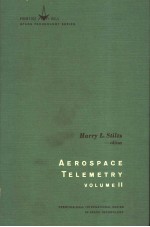
1.SATELLITE AND SPACE PROBE TELEMETRY 1
by Robert W.Rochelle 1
PART A.CHARACTERISTICS OF SPACE MODULATION SYSTEMS 1
1.0 Introduction to Space Telemetry 1
2.0 Space Channel 2
3.0 Galactic Noise 3
4.0 Communications Effciency 4
5.0 Telemetry Systems Analysis 20
PART B.SATELLITE TELEMETRY SYSTEMS 23
1.0 Source Encoding 23
2.0 Channel Encoding 26
3.0 Data Storage Systems 30
4.0 Spacecraft Transmitters 33
5.0 Spacecraft Antennas 34
PART C.SPACE PROBE TELEMETRY 36
1.0 Introduction 36
2.0 Group Codes 36
3.0 Parity Codes 40
4.0 Microelectronics 41
PART D.COMMAND AND TRACKING 45
1.0 Command Systems 45
2.0 Tracking 50
PART E.DATA ACQUISITION AND PROCESSING 55
1.0 Introduction 55
2.0 Ground Station Equipment 55
3.0 Data Processing 58
4.0 Computer Processing 59
2.FM DATA SYSTEMS 60
by J.H.Crow 60
PART A.HISTORY OF THE FM MULTIPLEX 60
1.0 Introduction 60
2.0 The FM/FM Technique 61
PART B.THEORY OF FREQUENCY MODULATION 63
1.0 Theory of Frequency Modulation 63
PART C.FM DATA SYSTEM ANALYSIS 71
1.0 System Accuracy 71
2.0 Type Ⅰ FM Data System 73
3.0 Type ⅡFM Data System 83
4.0 Type Ⅲ FM Data System 93
5.0 Type Ⅳ FM Data System 96
6.0 Type Ⅴ FM Data System 99
3.SINGLE SIDEBAND FM TELEMETRY 105
by Walter O.Frost 105
PART A.INTRODUCTION TO SS/FM TELEMETRY 105
1.0 SS/FM Defined 105
2.0 Telemetering of Wideband Data 106
3.0 History and Background 108
PART B.PRINCIPLES OF SS/FM 110
1.0 Single Sideband Modulation and Demodulation 110
2.0 Characteristics of Wideband Data 112
3.0 Operation of the SS/FM Transmission Link 116
4.0 S/N Performance of SS/FM 123
5.0 Crosstalk Noise in SS/FM 130
6.0 Summary of Part B 131
PART C.DESIGN AND APPLICATION OF SS/FM EQUIPMENT 131
1.0 Introduction 131
2.0 SS Modulation Techniques 132
3.0 SS Channel Separation and Demodulation 136
4.0 Carrier Generation and Reconstruction 142
5.0 Automatic Deviation Control 149
6.0 Pilot Signal Conditioning and Processing 152
7.0 System Design Considerations 154
8.0 Summary and Conclusions 164
4.ADAPTIVE TELEMETRY―DATA COMPRESSION 167
by Daniel Hochman and Donald R.Weber 167
PART A.INTRODUCTION TO ADAPTIVE TELEMETRY 167
1.0 Background 167
2.0 Definition 168
3.0 Sampled Data System 168
PART B.PRINCIPLES OF DATA COMPRESSION 169
1.0 Introduction 169
2.0 Adaptive Sampling 170
3.0 Redundancy Reduction 171
3.1 Polynomial Predictors 175
4.0 Data Reconstruction and Presentation 179
PART C.ELEMENTS OF REDUNDANCY REDUCTION SYSTEMS 783
1.0 Introduction 183
2.0 System Organization 184
3.0 Miscellaneous Consideration 188
PART D.APPLICATIONS OF REDUNDANCY REDUCTION 190
1.0 Design of a Data Compressor Employing Redundancy Reduction 190
2.0 Ground Applications of Data Compression 198
PART E.CONCLUSIONS 202
5.PACM-PULSE AMPLITUDE/CODE MODULATION 202
by Warren F.Link 202
PART A.SYSTEM DESCRIPTION 202
1.0 General 202
2.0 Data Encoding and Formating 203
3.0 Mechanization and Relationship to Other Telemetry Systems 206
PART B.SYSTEM DESIGN 210
1.0 Word Format 210
2.0 Synchronization Methods 214
3.0 Frame Structure―Parameter Selection 216
4.0 Design Example 219
5.0 Carrier Considerations 225
PART C.VEHICLEBORNE EQUIPMENT 230
1.0 General 230
2.0 Data Encoding and Logical Design 232
3.0 Transmitter 241
PART D.GROUND EQUIPMENT 242
1.0 General 242
2.0 Subsystem Descriptions 243
3.0 Data Recording 250
4.0 Computer Entry 250
APPENDIX 252
3-A Signal-to-noise Performance of an SS/FM Transmission Link 252
INDEX 255
